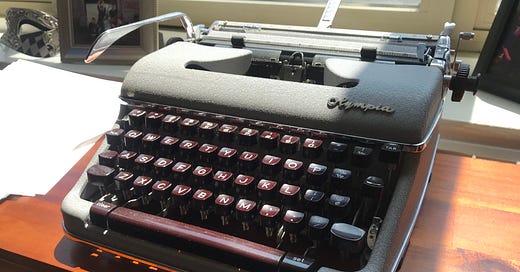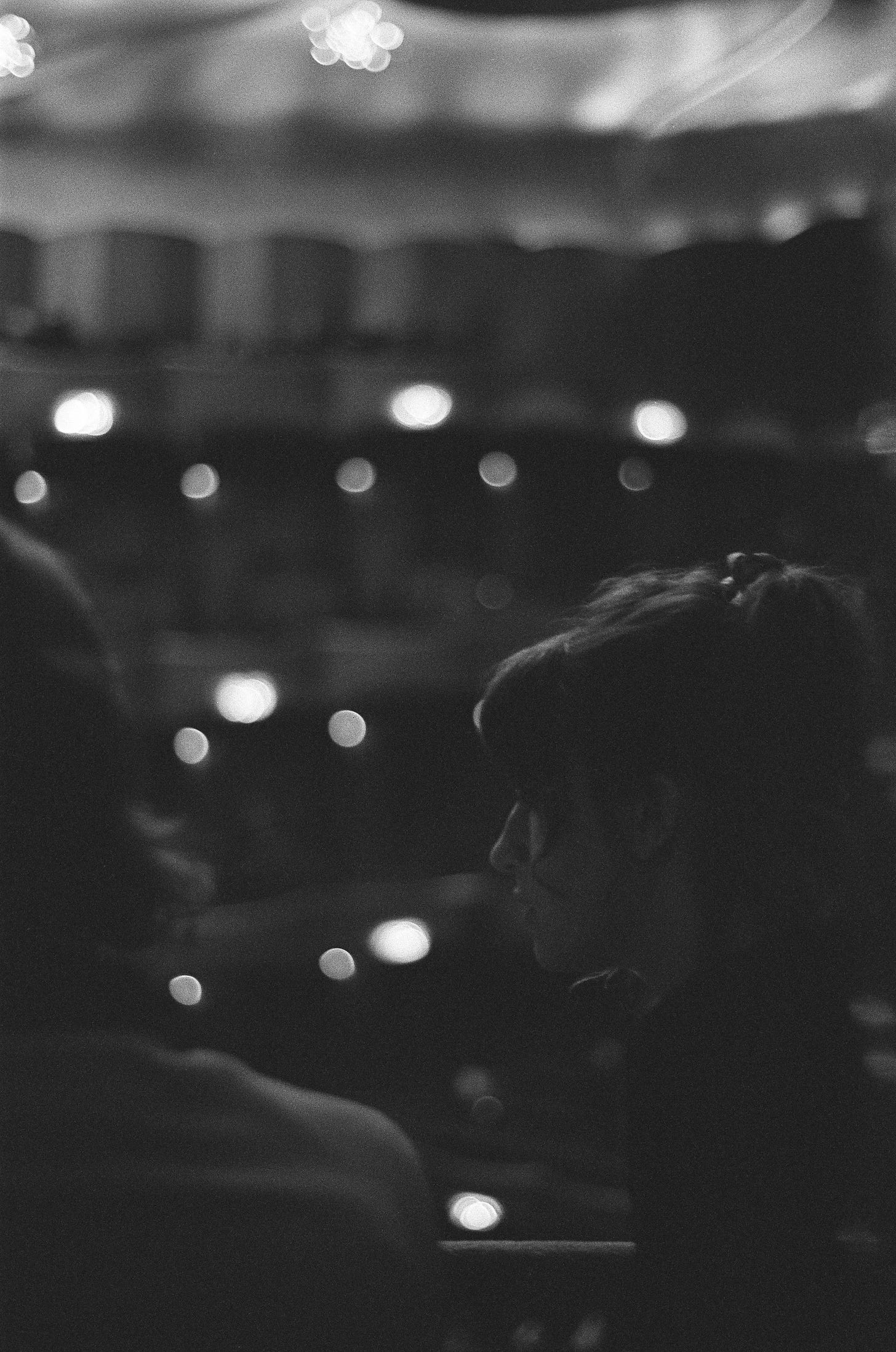De-Online Detox (Dying on the Jonah Hill)
Shooting with film, tuning out social media, and approaching women IRL
A little over a year ago, a close friend of mine got married, and when thinking of what to get him for his wedding gift, I decided on a Yashica twin lens reflex camera. It’s one of those boxy old film cameras that kind of looks like a stereopticon mixed with a jack-in-the-box. For years, I’d owned a couple of 35mm cameras that I’d sometimes bring out, and I’d noticed my soon-to-be married friend always admired them and loved the pictures I’d take. So why not get him his own?
I’m not a photog by any means, but I do love shooting with my film cameras. My favorite subjects are people I know. Sometimes I want candid shots. At others, I want them looking straight into the lens with a big goofy smile. Street photography can be fun too, especially if I’m looking for an excuse to just roam around a neighborhood. I’m not interested in landscapes or abstract artsy shots. They don’t hold much sentimental value for me.
I always make it a point to send people pictures I take of them. They always seem delighted when I do so, probably because they’d forgotten I’d even taken them in the first place. It’s not as if I shoot a ton, so weeks and even months can pass before I finish a roll and can get it developed. From a technical perspective, the photos might be sharper if I used a digital camera, and sometimes, there are flaws like light streaks, over/underexposure, or a hurriedly sloppy composition. Still, that’s what makes these pictures fun.
There have been some recent articles about how young people are ditching phone cameras in favor of digital cameras. Who knows if this is a legitimate trend of yet another over-examination into Gen Z by an aging Millennial media establishing that’s desperate to remain forever young. But assuming it’s a genuine phenomenon, these young people’s sentiments make total sense. One says he takes fewer pictures with his digital camera than his phone, which then imbues each shot with more meaning and memory.
A film camera isn’t exactly difficult to use once you learn the concepts of aperture, shutter speed, and film speed. And once you download a quality lightmeter on your phone, the biggest challenge becomes making sure you load the film properly so you don’t end up shooting the dreaded blank roll (once happened to me in Japan).
But all that is certainly more complicated than simply pointing and shooting with a phone that has infinite storage and all sorts of algorithmic functions to supposedly optimize color saturzation, focus, and even the shape of one’s face. That’s what you’re saying when you take a film shot of someone: I think you’re worth an extra effort, and of these very finite number of shots I have, I’m going to spend one on you. With phone pictures—and video—becoming synonymous with surveilling people’s humiliations and offenses, the film shot is instead full of love and affection.
Speaking of humiliating and offensive… So Twitter, eh? Yes, it’s a shell of its former self now, and as much as I like to sneer at those who lament what a digital public square we’ve lost after the Elon Musk takeover, I do sympathize with them on a certain level. When I first moved to NYC, I didn’t know many people here besides a handful of college friends and even fewer law school friends. Trying to make new acquaintances at literary readings, writing workshops, and even with random roommates proved to not work that well. It wasn’t until I met the people with whom I’d start a magazine and podcast with that my social circle began to grow, and I’d first met that crew online. It’d been a happy coincidence that some of them also lived in NYC. And when we started becoming more active on Twitter and other social media, I’d meet more people that way, many of whom I’d end up meeting IRL. So as much as I look down on those who seem too socially reliant on things like Twitter for their social lives or sense of popularity, I have to admit I owe a good deal to those things too.
But there are obvious downsides to online socializing as well. I’m not someone who’s quick to anger in real life. Over my life, one of the most common descriptions I’ve heard of my personality must be “chill.” I have a brother who’s barely a year younger than me and since when we were single-digits years old, I can count on one hand the number of times we’ve fought. Many years ago, I once raged out at a friend over something soccer-related, which is the last time I can remember full-on yelling at someone in-person.
But I do get easily angry at people online. If those people were to say the same thing online but to my face, I think I’d be quite chill. Part of that would just be natural conflict aversion in IRL encounters. But when someone says something to you, even if it’s highly critical or even just insulting, there’s a certain level of respect being paid. He’s taken time out of his day and also risked putting himself in an uncomfortable, even potentially hostile, situation. There’s no performative aspect either, no flailing of arms or caterwauling to play to a crowd to garner sympathy. It’s just between you two.
In contrast, public online communication—like on Twitter—combines the worst of direct and passive aggression. So many things written and said online often feels personally targeted at you, even though chances are that it's not. But it’s worse because the attacker isn’t even paying you the baseline level of respect to addressing you in person and in private. Instead, he seems to be talking at you and past you, telling a one-sided story for everyone else to witness, with you either not being expected to reply or if you do, having to do so in front of a biased audience that he’s cultivated. And you probably don’t even know this perceived attacker beyond a few posts, if even that. So he becomes a caricature of a composite of your most resentment-drawing people from memories or from your imagination. And we all engage in our own personal Two Minutes Hate.
Which brings us to this Jonah Hill situation, which I admit has captivated me for the last couple of days. Its box-office draw is how anyone can project almost anything they want onto it. Hill’s messages are abnormally demanding and there’s plenty of grounds to ridicule him as insecure (the therapyese doesn’t help, either). But as far as I know, he didn’t force her to remain in the relationship, or string her along while pretending he was someone he was not until he’d wasted too much of her time.
I’ve never told a girlfriend what she can’t wear or what she can’t post. If anything, I’m more likely to be accused of being too aloof about that kind of stuff (i.e. chill). I never get jealous with girlfriends, to the point where I sometimes think I’d at least once like to experience what all-consuming Mr. Brightside-esque jealousy feels like in a relationship. What Hill demanded from his ex-girlfriend is something I’ve never done and would hopefully never do. So why do I find myself siding more with him than his attackers? It’s because it’s not about him. I do really love Superbad, but I don’t give a damn about Hill. It’s that when I see a post calling out guys like Hill for being abusive, I can’t help but see an ever-expanding definition of “abuse” that, if taken to its logical conclusion, means that whenever a man breaks up with a woman when she doesn’t want to, it’d be tantamount to some degree of abuse: the wielding of social justice concepts to better one’s odds in the harrowing dating game. Some women may be thinking that, but many aren’t. They’re talking about their own bad personal experiences that I don’t know about and never will. But online, it’s impossible to tell who’s who, so I’m left thinking, ‘Why am I feeling defensive over Jonah fucking Hill?’
My biggest de-onlineification effort happened last year, when for several months starting in the summer, I deleted my dating apps (even though I wasn’t in a relationship). Few parts have become rapidly and radically online-ified more than our dating lives, so after so many years of being on the apps, I wanted to feel what it was like again to be disconnected from them. It wasn’t a rage-quit, and I’ve never understood all of men and women’s griping about dating apps, mainly because my own dating life was pretty much barren before I started using them. I first downloaded Tinder in late 2013. If there were some halcyon days when attractive young singles were meet-cuting at bars, beaches, and bookshops, I’d never gotten the invite.
The timing felt right, with me having more or less gotten over adolescent hangups about how high or low my body count was, and having experienced enough on these apps that I figured I’d run the entire gamut of most of the possible experiences I could’ve had on them.
The summer (and about half of fall) became a kind of throwback time, taking me back to the 2000s when meeting women online was limited to supposedly shameful places like OKCupid and Match.com, and every social outing was laden with pressure to approach strangers or else have it be re-confirmed that you were a cowardly loser. One of the biggest benefits of dating apps was alleviation of that pressure, to just be able to enjoy evenings out (or even just trips out to a park, café, museum, etc.) for their own sake, and to not view every moment of keeping to yourself or your friends as lost opportunities.
It was a fun summer. Just as when I was much younger, there were many solitary walks home after an otherwise fun night out. But unlike then, such walks weren’t plagued by fears that sex, dating, and relationships were these heavenly things that might be out of reach for me. Finding ways to open conversations with women became a pleasant endeavor in and of itself, a piece of evidentiary exhibit that I at least wasn’t a timid mouse, especially in this age of dating apps that has shadowbanned rejection to a barely conscious process (which causes me to worry how young people, especially young men, will ever learn to deal with and brush off rejection). If the women weren’t interested or gave me a number or IG account that would never reply, that was fine. I just hoped our brief encounter was at least somewhat as enjoyable for them as it had been for me. By now for me, sex had become a bit boring anyway, in the best sense possible.









What’s most interesting about the Jonah Hill thing is that progressive women said for years that men needed to go to therapy, but when Hill used the language of therapy to set boundaries, suddenly they hated on therapy.
I had the exact same experience with online dating somehow packaging a lot of those anxieties in a little box. A mixed blessing for sure but the year I took off of it was way more angsty than what followed.